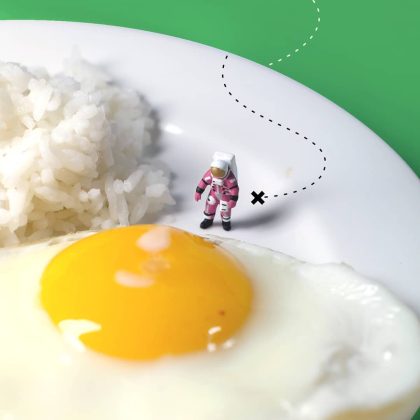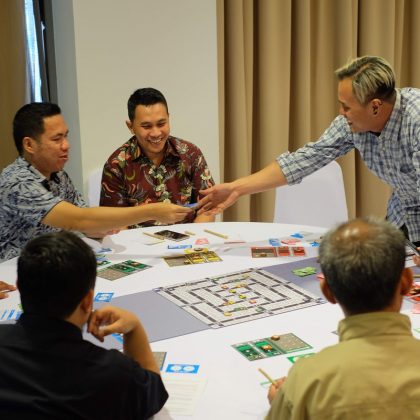RESEARCH & INSIGHT

The Impact of GBL on Teaching Integrity in 21 Klaten Primary Schools: An Empirical Investigation
This study explores the effectiveness of game-based learning (GBL) in teaching integrity at elementary schools, involving 26 teachers from the Integrity School Program in Klaten. After undergoing training to implement and modify games, teachers applied GBL in their classrooms. The findings revealed that GBL significantly increased students' enthusiasm, facilitated knowledge transfer by teachers, and improved the school's reputation in the community. Moreover, GBL proved effective in instilling values of integrity, such as honesty, respect, and fairness, in students, aligning with the character education framework developed by Webber.
The study highlights the potential of GBL as an interactive and enjoyable pedagogical tool to integrate moral education into formal teaching. However, implementing GBL requires comprehensive preparation, adequate resources, and sufficient time. The study suggests the need for policy support to facilitate the broader adoption of GBL and further research to address limitations, such as reliance on teacher reports and the lack of direct data from students.
The study highlights the potential of GBL as an interactive and enjoyable pedagogical tool to integrate moral education into formal teaching. However, implementing GBL requires comprehensive preparation, adequate resources, and sufficient time. The study suggests the need for policy support to facilitate the broader adoption of GBL and further research to address limitations, such as reliance on teacher reports and the lack of direct data from students.
DOWNLOAD EPAPERS
Send download link to:

Capacity Development for Game Based-Learning Design and Its Utilization based on Local Conditions of Papua in Strengthening Integrity Value
This report details the implementation of the "Capacity Development for Game-Based Learning Design and Its
Utilization based on Local Conditions of Papua in Strengthening Integrity Value" program.
The initiative aimed to enhance the capabilities of anticorruption instructors in Papua to implement game-based learning programs and interactive sessions for socializing integrity values.
The program consisted of a comprehensive workshop conducted on July 27, 2024, followed by post-workshop support, designed to equip participants with the necessary skills to conduct effective game-based learning sessions in their respective areas.
Utilization based on Local Conditions of Papua in Strengthening Integrity Value" program.
The initiative aimed to enhance the capabilities of anticorruption instructors in Papua to implement game-based learning programs and interactive sessions for socializing integrity values.
The program consisted of a comprehensive workshop conducted on July 27, 2024, followed by post-workshop support, designed to equip participants with the necessary skills to conduct effective game-based learning sessions in their respective areas.
DOWNLOAD REPORT
Send download link to:

Simple Gamification Implementation to Promote Mental Wellness
The Covid-19 pandemic has caused serious issues regarding the mental health of the people of Indonesia, especially for Indonesian young adults. This is particularly concerning since young adults are simultaneously the productive members of their family while still holding the potential to greatly increase their contribution in the future.
Therefore it is necessary to explore methods that are easily applicable by Indonesian youth that enable them to manage stress during challenging times. This particular guide has been field-tested in different environments, by different organizations, for diverse participants and has been proven to be an effective tool for stress management for anyone regardless of their situation and background. Furthermore, the tools in this guide are pragmatic and easily applicable without the need for previous training and background knowledge.
Therefore it is necessary to explore methods that are easily applicable by Indonesian youth that enable them to manage stress during challenging times. This particular guide has been field-tested in different environments, by different organizations, for diverse participants and has been proven to be an effective tool for stress management for anyone regardless of their situation and background. Furthermore, the tools in this guide are pragmatic and easily applicable without the need for previous training and background knowledge.
DOWNLOAD E-PAPER
Send download link to:

Gastronot: A Pilot Project for Promoting Healthy Eating Habits Using Mixed-method Study Design
Eating habits are formed from childhood and develop into adulthood. Unhealthy eating habits will persist into adulthood and can lead to various diseases. Healthy eating and behaviour should be taught using engaging tools. The study aims to pilot nutrition education using the game-based learning approach, implementing a specially designed learning board game entitled "Gastronot".
DOWNLOAD E-PAPER
Send download link to:

Initial Gamification Project to Increase Mental Health Awareness for Indonesian Youth
This paper presents a research design and the preliminary results of our initiatives to explore a gamification approach to increasing mental health awareness among Indonesian youth. Considering the current knowledge about mental health among youth in Indonesia, this study proposed a mixed method of research using both qualitative and quantitative approaches. This approach is believed to best explain the stigma o people with mental health disorders among youth.
DOWNLOAD EPAPERS
Send download link to:

The Use of Paper Toys in Social Media to Increase Medical Students Ability in Developing Health Promotion Program
To support the medical students in their next role as leaders on health promotion and preventive care to ensure the health of the community, a project using paper toys and social media is piloted. This is a case study involving health communication about several health topics using paper toys to better understand the use and effect of social media in health communication. Fourth-grade medical students (160 students) assigned to 33 groups develop health promotion programs in the form of a creative and fun poster.
The results showed there were more than 70 posters with health promotion-related contexts were created. The published posters (through Instagram) gained more than 4600 likes and 93 comments and around 100.000 impressions in just one day. Through this activity we observed the potential use of gamification, integrating creative concepts and social media into one new approach in health promotion.
The results showed there were more than 70 posters with health promotion-related contexts were created. The published posters (through Instagram) gained more than 4600 likes and 93 comments and around 100.000 impressions in just one day. Through this activity we observed the potential use of gamification, integrating creative concepts and social media into one new approach in health promotion.
DOWNLOAD EPAPERS
Send download link to:

Building Thalassemia Awareness by Using Games
Thalassemia is an inherited autosomal recessive blood disorder, characterized by abnormal hemoglobin due to
mutation. In severe conditions, patients will require regular blood transfusions with common complications of iron overload and spleen enlargement. Jawa Barat as the province with the biggest population with thalassemia in Indonesia can be an example of a participatory educational approach to program implementation and genetic screening.
This study aims to determine the different levels of awareness between before and after the knowledge of thalassemia are given using the medium of games to selected high school students in Bandung. Therefore, this study is a comparative analytical research undertaking with quasi-experimental research using the one-group pretest-posttest design.
mutation. In severe conditions, patients will require regular blood transfusions with common complications of iron overload and spleen enlargement. Jawa Barat as the province with the biggest population with thalassemia in Indonesia can be an example of a participatory educational approach to program implementation and genetic screening.
This study aims to determine the different levels of awareness between before and after the knowledge of thalassemia are given using the medium of games to selected high school students in Bandung. Therefore, this study is a comparative analytical research undertaking with quasi-experimental research using the one-group pretest-posttest design.
DOWNLOAD EPAPERS
Send download link to:

ThinkLog: Interactive Learning for Supply Chain Management
Serious games have been used to facilitate learning and training processes with examples of implementation in
healthcare and military training. The learning objectives of these games are to help the players understand specific and complex concepts. This paper focuses on developing a board game, named ThinkLog, to facilitate learning on Supply Chain Management (SCM).
It serves as a face-to-face interactive learning tool that can be expanded to cover variations of scenarios. Using two interactive sessions with government officials, we are able to validate that ThinkLog was effective in deepening the players’ understanding of SCM concepts.
healthcare and military training. The learning objectives of these games are to help the players understand specific and complex concepts. This paper focuses on developing a board game, named ThinkLog, to facilitate learning on Supply Chain Management (SCM).
It serves as a face-to-face interactive learning tool that can be expanded to cover variations of scenarios. Using two interactive sessions with government officials, we are able to validate that ThinkLog was effective in deepening the players’ understanding of SCM concepts.
DOWNLOAD EPAPERS
Send download link to:

Extendable Board Game to Facilitate Learning in Supply Chain Management
Game-based learning has been introduced as an interactive tool to facilitate learning and training processes in various fields, including supply chain management (SCM). To facilitate learning in SCM we propose a board game, titled ThinkLog, a face-to-face extendable framework.
It can be extended to generate different scenarios (humanitarian logistics and urban logistics) for various concepts in SCM without changing the basic game structure.
These scenarios have been evaluated on four-interactive sessions with government officials and policymakers in Indonesia.
Our learning objective evaluation also shows that the game is effective in deepening the players’ understanding of SCM concepts.
It can be extended to generate different scenarios (humanitarian logistics and urban logistics) for various concepts in SCM without changing the basic game structure.
These scenarios have been evaluated on four-interactive sessions with government officials and policymakers in Indonesia.
Our learning objective evaluation also shows that the game is effective in deepening the players’ understanding of SCM concepts.
DOWNLOAD EPAPERS
Send download link to:

Creative Learning and Research Through Modern Board Game
In this paper, we discuss the potential values of the modern board game, not only as an entertainment media but also as an educational media and a research tool. The first part of the paper presents some definitions, studies on a modern board game, their characteristics, and their potential value as a creative industry. Later part of the paper we discuss the social interaction value, the information sharing level, its impact on motivating collaboration, and the engagement level created by the modern board game.
Moreover, we argue that it is the particular combination of highly valuable content (themes and design), intellectual engagement created by the creative gameplay, and the structured social experience offered by these games are the key to unlocking their potential values. In the last part of the paper, we discuss the innovative approach, using modern board games and interactive play, to improve the effectiveness of the learning and research processes in a developing country.
Moreover, we argue that it is the particular combination of highly valuable content (themes and design), intellectual engagement created by the creative gameplay, and the structured social experience offered by these games are the key to unlocking their potential values. In the last part of the paper, we discuss the innovative approach, using modern board games and interactive play, to improve the effectiveness of the learning and research processes in a developing country.
DOWNLOAD EPAPERS
Send download link to:

Memory Game for Children: An Alternative Solution to Help Children with ADHD
Children with Attention Deficit Hyperactivity Disorder (ADHD) usually have problems expressing themselves. With play therapy, they could reduce the problem. A recent study has revealed video games might be an alternative therapy for children with ADHD. This research is to analyze the data that was collected from a prototype game that has been developed and created.
The game is created using Construct 2. To collect data from the game, a back-end web application was created using PHP and MySQL. Several data that have been used in this research paper are score, incorrect house, and incorrect fruit. In conclusion, the result is usually better when the children play with visual instruction rather than with audio instruction.
The game is created using Construct 2. To collect data from the game, a back-end web application was created using PHP and MySQL. Several data that have been used in this research paper are score, incorrect house, and incorrect fruit. In conclusion, the result is usually better when the children play with visual instruction rather than with audio instruction.
DOWNLOAD EPAPERS
Send download link to:

Performance Test for Prototype Game for Children with ADHD
The gaming industry has become one of the fastest-growing industries in the world. In recent years there have been several studies that have used games, especially computer-based ones to improve the executive function of children with Attention Deficit Hyperactivity Disorder (ADHD), especially in working memory improvements. There are still several obstacles in using computer-based games that have been circulating today in Indonesia. The aim of this research is to develop and create a prototype game that can be used to improve the working memory of children with ADHD using Bahasa Indonesia.
The prototype game application is a racing game with matching colors and memory work tasks; developed using Construct2. Players will play as a driver, delivering certain fruits to specific homes with different colors. The game also included visuospatial tasks such as remembering the objects. For performance tests, CPU utilization, average FPS, and image memory usage have been tested in several browsers. In conclusion, the performance tests results show that the first type of prototype game is good enough to be played on a desktop or laptop.
The prototype game application is a racing game with matching colors and memory work tasks; developed using Construct2. Players will play as a driver, delivering certain fruits to specific homes with different colors. The game also included visuospatial tasks such as remembering the objects. For performance tests, CPU utilization, average FPS, and image memory usage have been tested in several browsers. In conclusion, the performance tests results show that the first type of prototype game is good enough to be played on a desktop or laptop.
DOWNLOAD EPAPERS
Send download link to:
